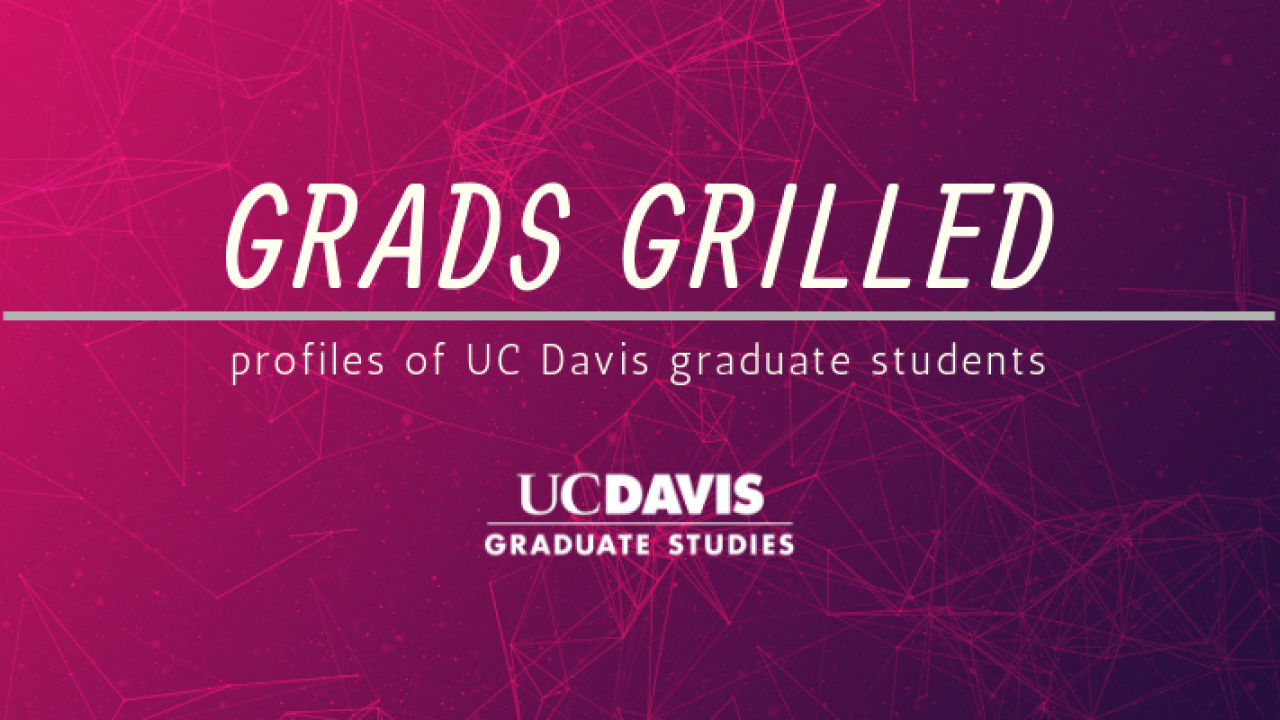
Graduate Student Profile: Ari Conterato, Sociocultural Anthropology
Meet UC Davis Graduate Student Ari Conterato
- Department

Sociocultural Anthropology
- Program and year of study
Ph.D., 3rd year
- Previous degrees and colleges
MA Social Sciences, University of Chicago
BA Critical Theory and History, University of Wisconsin-Madison
- Where did you grow up?
Just north of Chicago
- Where do you live now?
In Davis, just off campus
- What's your favorite spot in Davis?
Probably my backyard—fruit trees, a friendly neighbor-cat, a nice deck. Plus, being from Chicago, it is still magical when I find myself sitting outside comfortably in February or March.
- How do you relax?
Being outside in nature. I also like reading and watching TV or movies but, ideally, if I am really looking to relax, I like to cook or bake. When there is a lot of stress to get things done, there is nothing a late-night baking session cannot fix.
- What was the last book you read for pleasure?
The Long Drop by Denise Mina
- What TV show are you currently binge-watching?
The Great British Baking Show
- Research interests
I am interested in what I call practices of making nature—that is, ways in which people (ranging between scientists, ecologists, environmental activists, artists, politicians, hunters, farmers) design and produce “nature.” More specifically, I am looking at rewilding projects, which try to transform human-altered places into “wild” or “natural” environments. I am especially interested in the aesthetic decisions incorporated in these projects and how the boundaries between culture/nature and design/science are navigated.
- Dissertation title or topic
My working title is Making Local Nature: Aesthetic Practices and Rewilded Imaginaries.
- Please share a surprising or noteworthy fact or finding from your research
While conducting research in Iceland, one of the local historians took me on a hike. He had worked on a history of place names and was explaining to me the meanings of different geographical features—the Valley of the Angelica, the Idiot’s Pass, Halibut Lake. He pointed at a field lying at the base of the mountain on which we were hiking and said, matter-of-factly, “That is the Field of Immortality. A plant grows there which makes your immortal.” In response to my amazement, he shrugged. “There’s another one on the next peninsula over too. So not too special.”
- Which professor or class inspired you to pursue graduate studies?
While I always remember wanting to pursue graduate studies, my interest in anthropology comes from Judith Farquhar’s class on “Ontological Politics” at University of Chicago. When I enrolled in that class, I thought I wanted to be a sociologist. I had never actually taken an anthropology course before and I had no idea what to expect. After the first session, I realized I had found a community that understood me and in which I felt like I could belong.
- Which scholarly text do you wish you had written? Why?
Kathleen Stewart’s Ordinary Affects. Every time I read it, I feel inspired. It is not a traditional academic text in that it almost reads like a series of vignettes but, at the same time, it is incredibly effective as a piece of conceptual writing. It also has the amazing capacity of engaging readers from almost any background; I’ve read the book in three different courses and each time, regardless of the interests of the other people in the seminar, everyone seems to get a lot out of the text.
- What's the best thing about being a grad student?
Being able to make your own schedule. When you are “working,” it means spending a lot of time thinking and reading. I think, especially right now, it is also incredibly special to be in a, generally, progressive culture. That doesn’t mean that there are not problematic perspectives in the academy but being around a high percentage of critical thinking people who hope to effect positive change in the world is not necessarily the norm.
- What's the worst?
I think the hardest thing for me is the ambiguity of the work/life division. The expectation that, because you are working on something about which you are passionate, you are expected to live as if your work is central to your day-to-day life
- If you weren't a grad student, what would you be doing?
Working as an environmental consultant. Or baking.
- Finally, please ask yourself a question - "What is the point of your research for someone who has no interest in your discipline?"
I think a lot of the time we don’t ask ourselves as graduate students to justify our research to people actively are disinterested in our discipline. For me, I think it is essential to research practices of “making nature” because, in our current era of climate change/Anthropocene/environmental crisis, we need to ask ourselves the question: “What do we want the world to be like?” People who work explicitly with the environment often take this question for granted and move forward with projects that they are unsure how to justify.
Graduate student profile courtesy of the UC Davis College of Letters and Science.
About Graduate Studies
Graduate Studies at UC Davis includes over 100 dynamic degree programs and a diverse and interactive student body from around the world. Known for our state-of-the-art research facilities, productive laboratories and progressive spirit – UC Davis offers collaborative and interdisciplinary curricula through graduate groups and designated emphasis options, bringing students and faculty of different academic disciplines together to address real-world challenges.
UC Davis graduate students and postdoctoral scholars become leaders in their fields: researchers, teachers, politicians, mentors and entrepreneurs. They go on to guide, define and impact change within our global community.
For information on Graduate Studies’ current strategic initiatives, visit the Graduate Studies strategic plan page.
